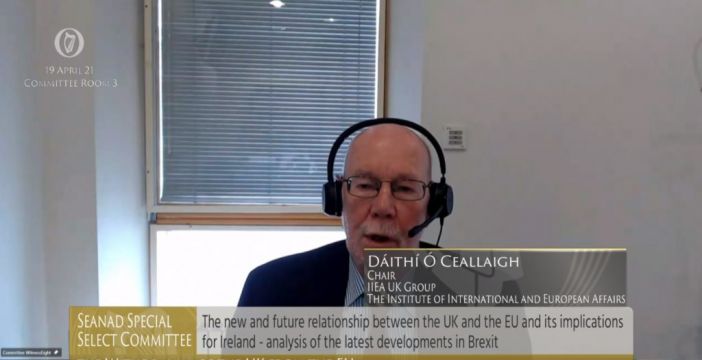Ireland’s former ambassador to the UK says travel restrictions have affected political relationships, particularly around Brexit matters.
Daithi O’Ceallaigh said the lack of face-to-face engagement between officials and politicians in London, Dublin and Brussels made it difficult to resolve issues.
The chairman of the Institute of International and European Affairs (IIEA) UK group made the comments to the Seanad committee.
He said the damage caused to the relationship between the UK and Ireland post-Brexit is “deep and serious”.
Today from 3pm, Daithí Ó Ceallaigh, Chair of the IIEA's UK Expert Group, joins the Seanad Special Select Committee on the Withdrawal of the UK from the EU to share his perspective on future #Ireland-#UK relations post-#Brext.
Watch live here: https://t.co/D2iZepJ992 pic.twitter.com/YAAp3ZYSKTAdvertisement— IIEA (@iiea) April 19, 2021
Fine Gael senator Tim Lombard asked whether the lack of one-on-one engagement because of Covid-19 restrictions had affected relationships.
He said there has been a “deficit of engagement” between Westminster and the Irish Government.
Mr O’Ceallaigh said: “It has been impossible for people to have those private arrangements, a private lunch or chat or dinner.
“I think a lot of the difficulties which have occurred in Northern Ireland and during the negotiations that eventually led to the agreement last December, they could have been eased had there been face-to-face meetings instead of being stuck as we are now in different rooms (because of) Covid.
“Covid has had a negative effect and made it very difficult to build up the sort of arrangements you would like.
“We are not looking any time before early summer before we would be allowed to go to London and have a chat with a few people – I think it would be September or the autumn before you have those inter-parliamentary meetings.
“I think Covid has made governance in the north particularly difficult. It was difficult as it was but when you miss the body language it can make things difficult.”
He described the Brexit deal as a “very thin one”, adding that British officials rejected many EU proposals, citing sovereign issues.
He also told the committee that future negotiations between the UK and the EU will be “fractious”.
“There will be very many negotiations because there are many areas where arrangements haven’t been made.
“There is little trust in Brussels of the UK and there is very little trust among member states, particularly one major member state.
“The manner in which they decided to break international law with the Northern Ireland Protocol and the bilateral decisions they took, none of that has served to build up trust between London and Brussels.
“If you want to do business internationally, there has to be trust.”







